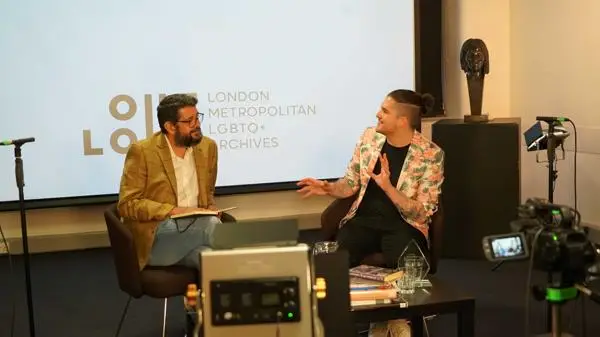LGBTQ+ conference 2021
Speed ‘Date’: 20 years of LGBTQ+ History
My name is Jasmine Bullock and I’ve had the pleasure volunteering at London Metropolitan Archives for a couple of weeks, mostly with the Engagement and Learning team but also with Conservation.
On Saturday 4 December 2021, the Engagement and Learning Team facilitated the LMA annual LGBTQ+ conference: Speed 'Dates': 20 Years of LGBTQ+ History. This year’s conference marked the 19th year of LMA’s LGBTQ+ conferences and so 19 guest speakers took us on a trip down memory lane by recounting the previous LGBTQ+ conferences LMA has hosted and the themes they focussed on. The conference was hosted by Sean Curran who is the Senior Inclusive Heritage Advisor at Historic England. Speakers were either presenting live from the archive or virtually via pre-recorded talks they had sent in. Each speaker had five minutes to present, and yes everyone kept to time!
Our first speaker for the day was Peter Tatchell, a British human rights campaigner who is well known for his work on championing LGBTQ rights. Peter started the conference by reflecting back on the struggles of the last 19 years, noting both what has and hasn’t been achieved. Next up we heard from Kate Charlesworth, cartoonist, illustrator, and graphic novelist, followed by Gillian Murphy whose video looked at the history of the Hall Carpenter Archives. Del LaGrace then took us on a five minute tour of the queer body. We then wrapped up the first part of the day with a talk from Matt Cook, reflecting on his 2007 talk ‘Let’s pretend’, a look at LGBTQ family lives before taking a well-deserved break.

Part two of the day took us from 2008 to 2012. Speakers included Sue Sanders, founder of LGBTQ history month followed by Nick Field reflecting on his time as artist in residence at LMA and the relationship between artists and archives. Finally, Jan Pimblett who was Principal Development Officer at LMA 2001-2019
After another break we returned to part three and the years 2013 to 2017. Alan Butler, trustee of the Oral History Society where he chairs their LGBTQ special interest group started in 2013 with a revisit to the conference ‘Brave New World. Alan was followed by Justin Bengry, Director of the Centre for Queer History at Goldsmiths, next was John Vincent, author of LGBT people and the UK cultural sector. This was followed by Dan Glass, healthcare and human rights activist and finally Clare Summerskill, who spoke on the importance of the role of the interviewer in LGBTQ oral history interviews.
The final part of our day spanned 2018 to 2021 and featured Kamal Hussain discussing the relationship between religion and sexuality. Veronica Mckenzie revisited the Haringey Vanguard project which looked at the importance of BME LGBT histories. Finally, Shaan Knan spoke on the theme of ‘Unorthodox ’which asked who are still the missing voices? The conference then wrapped up with Sean talking about the next 20 years of LGBTQ+ programming at LMA. Let’s see what the future holds!
The hybrid format of the conference worked well, with only one minor tech issue. 143 people have viewed the content so far both live and on playback which shows a good level of engagement with the content. LMA are also hopeful to use the recorded conference as part of a package of material celebrating the 20th year of LGBTQ+ programming at the archive. As I had not been to any of LMA’s LGBTQ+ conferences before, this was an insightful crash course in the previous conferences as well as in queer history and the opportunity archives provide in safekeeping, reinterpreting and sharing that history with others. It was inspiring to be introduced to people fighting for equality and diversity within the UK and to hear their take on the role of archives and culture in that fight. LMA’s commitment to running these conferences really shows how championing inclusivity within the archive and its programmes is all about encouraging ALL Londoners to explore their history and to show them that their stories are as important as anyone else’s.